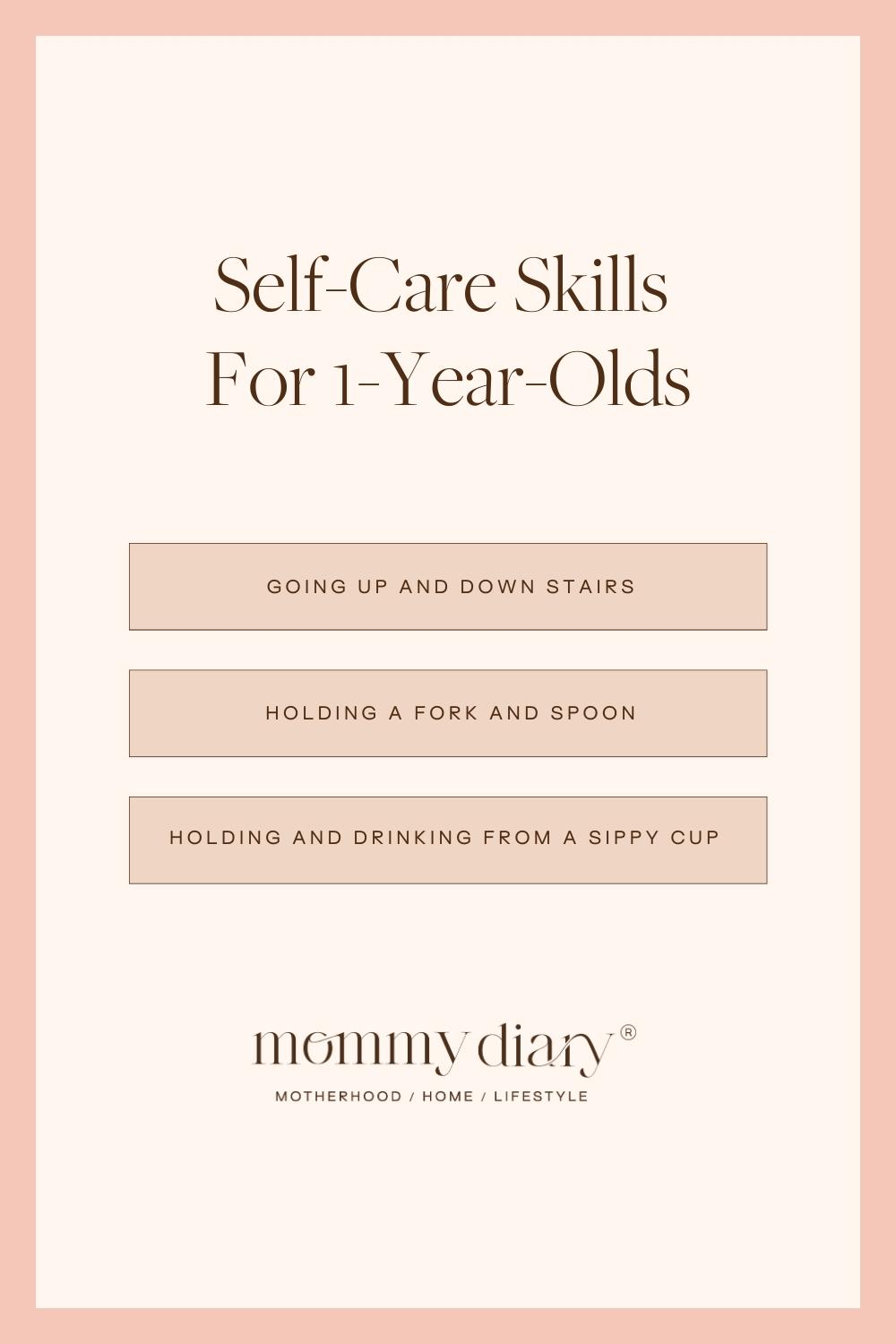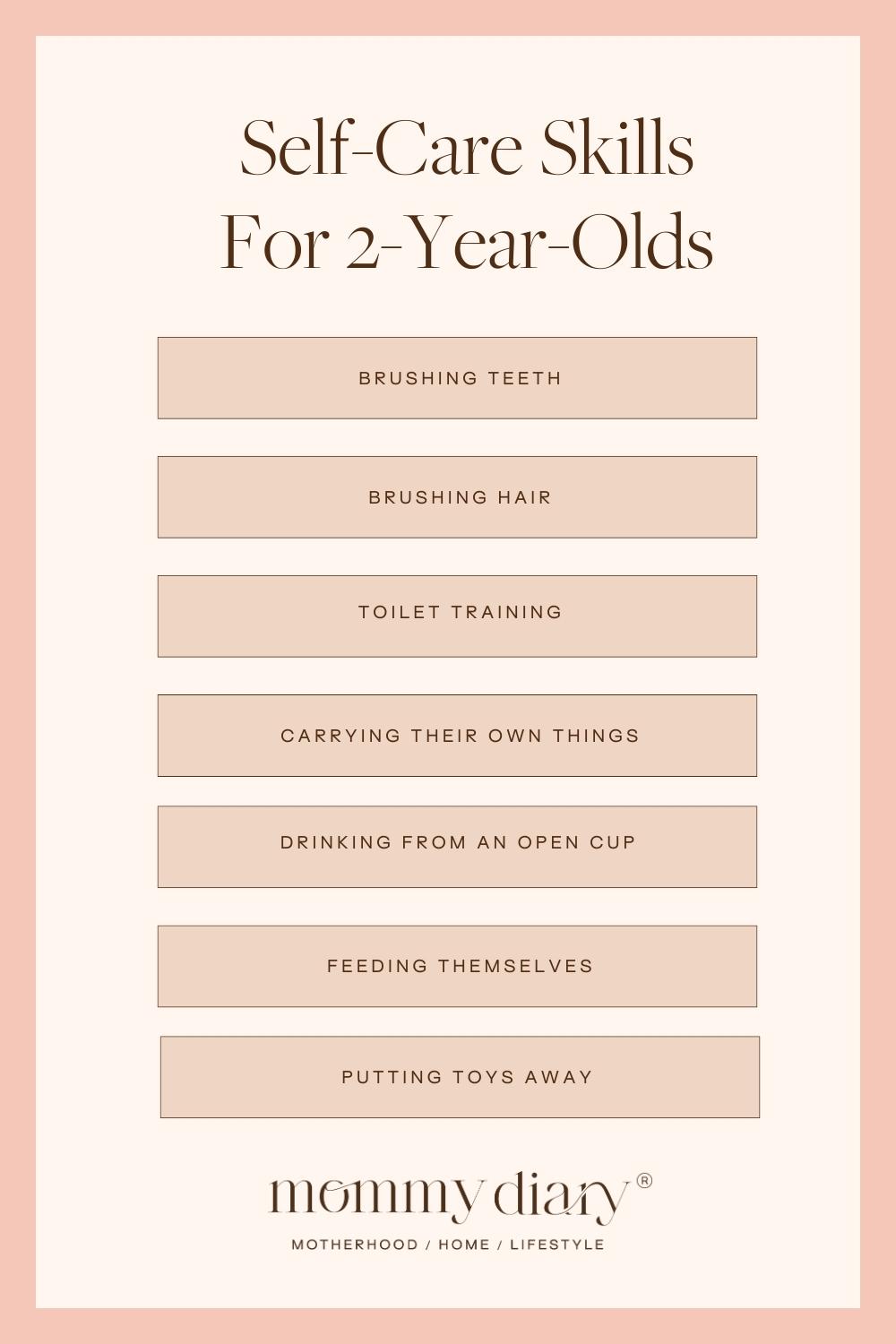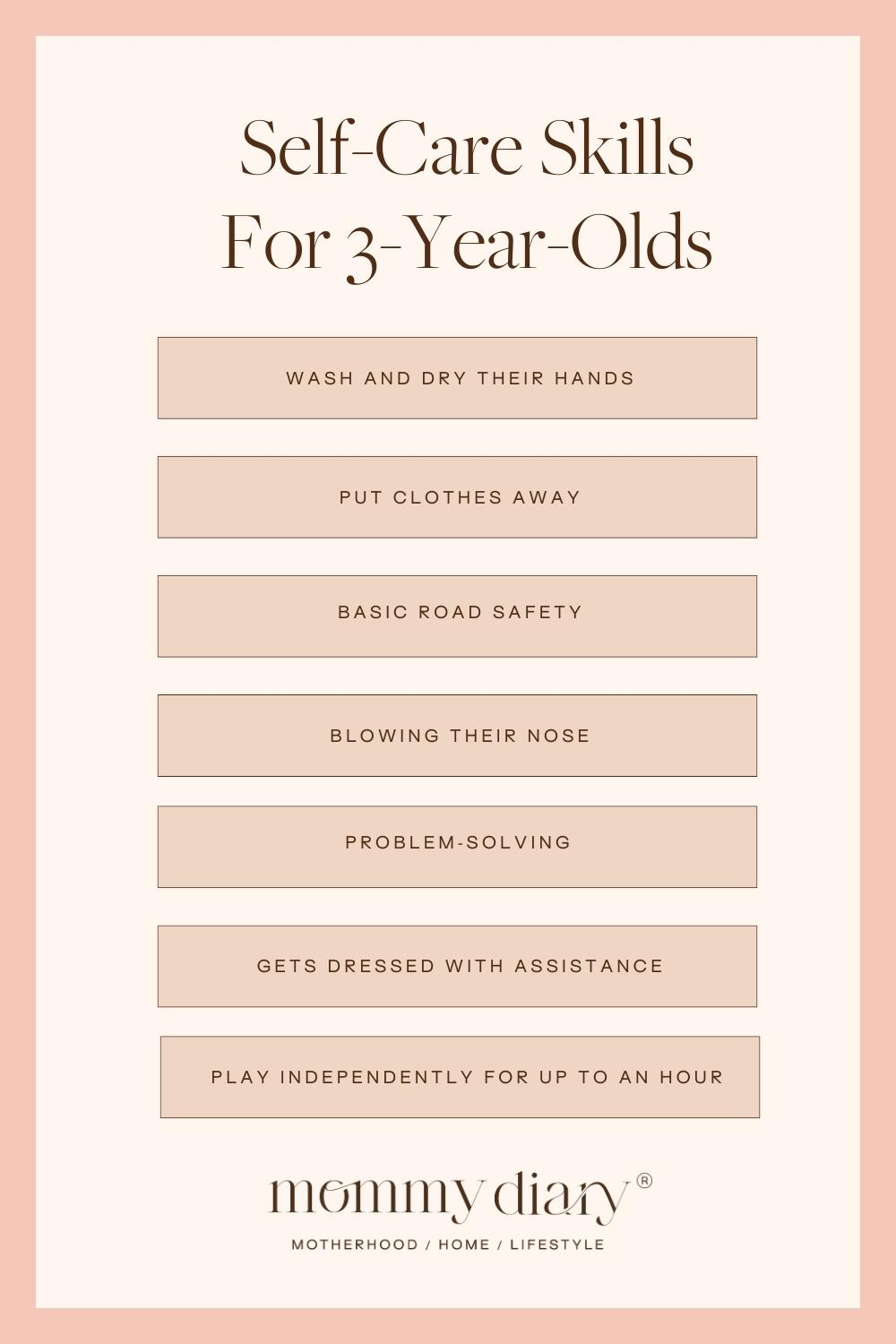Self-care skills, also known as activities of daily living, are essential aspects of a child’s growth and development. While they’re naturally more inclined to do things on their own, teaching kids age-appropriate self-care skills can encourage independence and boost their self-esteem. Traits all parents want for their children.
Sure, it’s potentially faster and less messy to do things on your own, like brushing their teeth and feeding them. But the benefits of learning self-care skills early on far outweigh the mess. Even more, it can also benefit parents and caregivers in the long run, as children begin to take on more and more responsibility for themselves.
Here are 20 age-appropriate self-care skills you can teach your children and watch them blossom:
20 Self-Care Skills For Kids

Self-Care Skills For 1-Year-Olds
Going Up And Down Stairs
Most kids between 12-18 months of age discover how much fun it is to climb on anything and everything. This is a great time to teach them how to safely ascend and descend the stairs in your home.
To start, hold your child’s hand as they climb up or down the stairs. As they get more comfortable, walk up the stairs behind them or climb down the stairs in front of them. Falling or tripping is part of the learning process. Just be sure to encourage them to keep trying.
Holding A Fork And Spoon
As children develop stronger fine motor skills, you can encourage them by giving them a fork and spoon at meal times. Even if they’re still eating mostly finger foods, providing utensils allows your child to use them when they’re ready. You can also inspire your child by showing them how you use a fork or spoon to eat.
Holding And Drinking From A Sippy Cup
Between the ages of 1 and 2, a child will start to learn how to hold and drink from a sippy cup. Remember, making a slight mess is all part of the learning process!

Self-Care Skills For 2-Year-Olds
Brushing Teeth
Oral health is another crucial aspect of a child’s hygiene routine. By the time they’re 2 years old, your child should begin to grasp the concept of brushing their teeth.
Encourage your child to mirror your behavior by brushing your teeth alongside them every morning and night. When they’re first learning how to brush their teeth, you might need to finish the job for them to ensure they learn proper technique and clean all the nooks and crannies in their tiny mouths.
Brushing Hair
Brushing or combing their hair is another skill you can mirror for young children. Have your little one stand next to you and mimic your movements. Remember to praise them for a job well done!
Toilet Training
The age at which you’ll begin toilet training varies from one kid to the next. As children develop, they’ll begin to show signs of readiness or develop an interest in using the toilet. Some children might be ready between the ages of 18 and 24 months, while others might be close to 3 years old before they become interested. As your child learns to understand what they’re feeling when it comes to their bowel movements, you can transition them to toilet training.
Carrying Their Own Things
When it comes to life skills that will make your life easier, children learning to carry their own things is certainly up there. As young children learn to carry their own bag or sippy cup, it gives them a sense of responsibility while also giving them one less thing to worry about.
Drinking From An Open Cup
Once your child becomes comfortable drinking from a sippy cup, it’s time to progress to drinking from an open cup. Remember, messes are a part of the learning process. As they learn how to drink from an open cup, they’ll make fewer messes so just try to stay patient!
*Easier said than done, I know! Read my post on how to be a calm parent for some tips on how to keep your cool in these moments!
Feeding Themselves
Most 2-year-olds will start to feel more comfortable feeding themselves with utensils and finger foods. And when the time comes to add a bigger range of foods, allowing them to figure to how to use these utensils from a young age will have them miles ahead.
Putting Toys Away
Here’s another life skill that you can get excited about. By the time your child reaches 2 years of age, they should begin to understand and follow simple directions, including “put these toys away.” You can encourage them to work on this skill by reminding them to clean up after themselves after playtime.

Self-Care Skills For 3-Year-Olds
Wash And Dry Their Hands
Another self-care task for children to learn is how to wash their hands. Properly washing and drying their hands is one of the more important everyday tasks for children and should be an important part of their daily routine.
Put Clothes Away
Your 3-year-old might not be able to hang up their own clothes yet, but at this age, they should be able to put away some clothing items. Encourage this life skill by instructing them to pick up specific items and put them where they belong.
Basic Road Safety
This is also a good time to start teaching your child road safety. As they begin to spend less time being pushed around in a stroller, they need to learn to be aware of their surroundings and how to keep themselves safe. Explain basic rules to them, like looking both ways before crossing, staying on the sidewalk, and paying attention to the traffic lights.
Blowing Their Nose
Blowing their nose is another self-care skill that varies from one kid to the next. Some 2-year-olds can master this skill, while other 3-year-olds still struggle with it. Either way, learning this skill early on can help prevent the spread of germs both around your house and at school.
Problem-Solving
Problem-solving is another important skill for children around this age. It’s important for us, as parents, to give our children opportunities to try to resolve problems on their own. As hard as it can be to sit back and watch, try to give your child time to figure it out.
While your child works through various problems, you can encourage them by boosting their confidence. A simple “You can do it!” can work wonders for their cognitive development and independence. Pretend play is an excellent way to encourage the growth of problem-solving skills.
Gets Dressed With Assistance
Many 3-year-olds will also start to learn about dressing and undressing with some assistance. You can help them put on their clothes, slip on their socks, and tie or buckle their shoes as long as they’re cooperating with dressing. Over time, they’ll be able to complete these tasks more independently.
Play Independently For Up To An Hour
By the time your child is 3, they should be able to play on their own for longer periods. Again, this varies from one child to the next and depends on whether there are other kids around for them to play with.
There are many different types of play that children tend to engage in. Depending on the type of play your child favors, you can find corresponding activities on my Amazon Storefront.
Self-Care Skills For 4-Year-Olds
Bathing Themselves With Supervision
Many 4-year-olds can start bathing themselves (washing their hair and body) with supervision. You can guide them by offering them an appropriate amount of shampoo and then showing them how to scrub their hair.
It’s important to note, however, that although it’s good to encourage independence at this age, a child shouldn’t be left unsupervised in the bathtub.
Learn Important Information
By the time your child is 4, they should start to learn important information like phone numbers and addresses. Go over this information with your child often to help them memorize it.
Help Prepare For And Clean Up After Meals
Last but certainly not least, a 4-year-old child should be able to help with meal time. You can have them set the table before meals or load the dishwasher afterward. This will give them a sense of responsibility and also allow them to feel more involved in household tasks and age-appropriate chores. You may even add a visual schedule for clean up time to guide them.
Self-care skills are an important part of a child’s growth and development.
As your child grows older, they will begin to learn many essential life skills. As parents, we need to nurture these skills and encourage them to become more responsible.
Just keep in mind that all children learn and develop at different rates. We can’t expect children to reach the same milestones at the same time as everyone else. Just stay patient, stay positive, and encourage them to do their best!
For more valuable information on parenting and motherhood, check out my blog and my podcast.

